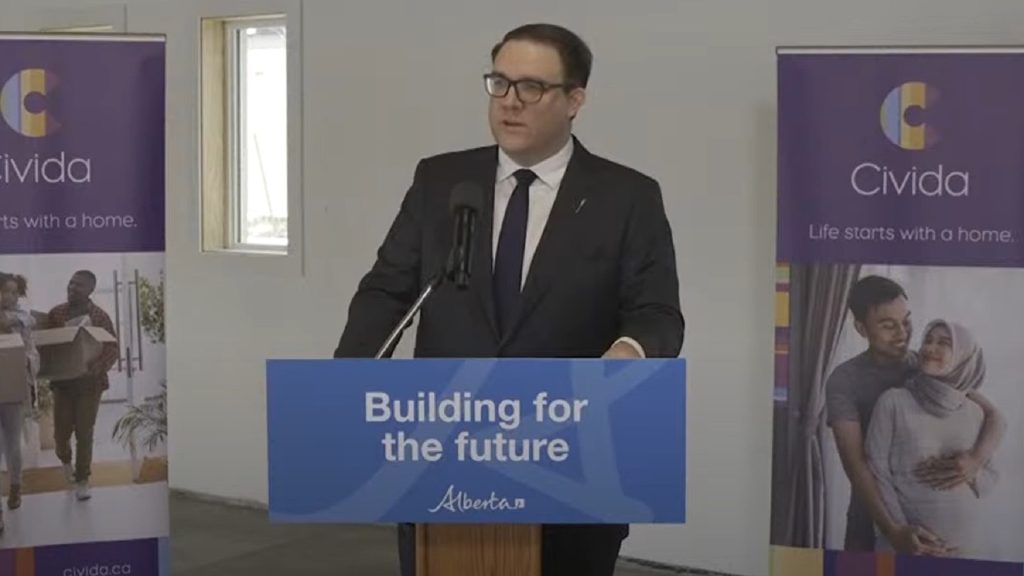Alberta commits $11.3 million to palliative care initiatives
Posted Aug 29, 2022 4:51 pm.
Last Updated Aug 30, 2022 12:59 pm.
The University of Calgary and MacEwan University are a couple of places that are receiving funding from the Alberta government, with 25 projects totaling $11.3 million for palliative care.
Minister of Health Jason Copping spoke at the Cumming School of Medicine on Monday about the $11.3 million, which is going to be used to enhance palliative care and End-of-Life care in the province.
“Accessible and compassionate palliative care requires a holistic approach from diagnosis to end of life. We’re thankful for the health providers, researchers, educators, community organizations and volunteers that make compassionate care a truly ‘whole of society’ effort. This announcement brings us closer to keeping our promise to provide quality palliative care that eases suffering and supports families,” Copping said.
The government made an announcement to fund palliative care in Sept. 2020, with the government putting $20 million towards the initiatives and research. They put $9 million towards new projects such as community hospice care, and education and training for health professionals.
University of Calgary is receiving funding for five projects, with part of the funding going into an initiative to see all medical students receive training in LEAP Core from Pallium Canada. It is a program that helps medical professionals work with patients that are in End-of-Life stages or in need of palliative care.
Copping said this will help physicians and all doctors graduating from UCalgary, and they will benefit once they enter the workforce in helping patients that need palliative care.
“By including this palliative care training for doctors, we’re ensuring that the next generation of clinicians are better equipped to support their patients with life-limiting illnesses,” Copping said.
Dr. Jayna M. Holroyd-Leduc, spoke about those suffering from frailty, which is defined as people having increased chances of experiencing adverse health outcomes.
She also adds that frailty is underdiagnosed in long-term care.
“This important funding will support our applied research in the area of early recognition of frailty within long-term care, as well as support early initiation of palliative care as appropriate to a residents degree of frailty and their goals of care,” said Holroyd-Leduc.
On top of the palliative programs, UCalgary is also looking at ways at increasing access to palliative care, along with analyzing the current level of palliative care in the province.
“Researchers at the Cumming School of Medicine are studying ways to improve access, assessments and interventions in palliative care. This funding supports their work to enhance coordinated and compassionate care for our citizens and demonstrates how a research-intensive medical school translates to better health care for our community,” said Dr. Todd Anderson, the dean of the Cumming School of Medicine.
MacEwan University is receiving funding for a project to redevelop their post-diploma certificate in hospice palliative care. Copping says this will help with more healthcare providers receiving access to training in palliative care.
In response to the need for more palliative care
The Alberta government put together a research report and framework on palliative care and End-of-Life care in 2014 called the Palliative and End-of-Life Care Engagement (PEOLC), and the final report was published in 2021.
According to the report, in Canada, palliative care developed as a way to meet local needs. It grew out of the increasing numbers of cancer cases that occurred in the 1970s, which were addressed by the formation of palliative care units within acute care hospitals for patients requiring end-of-life care. As a result, in Alberta, as in Canada generally, palliative care originated in acute care settings.
There are 257 publicly funded beds acute designated palliative beds in the province, and 126 publicly funded community-designed palliative beds. Calgary holds 121, and Edmonton holds 85.
The Alberta government predicts that the total population will be 6.3 million by 2046, with the average age increasing to 41.5 years, and the life expectancy averaging around 85 years for all people.
They add that cancer-related deaths account for 85 per cent of palliative care services.
In addition to the beds and who needs palliative care, they say around 270,000 Canadians die each year, with 27,000 being Albertans. 90 per cent of them are caused by cancer, heart disease, organ failure, dementia or frailty. They estimate by 2036, Canadian deaths will increase from 270,000 to 425,000.
In September 2020, participants that spoke with the government said that transitioning from a reactive, treatment and therapy-based approach for life-limiting illnesses to a more proactive, holistic, integrated palliative approach requires a systemic shift.
Dan Williams, MLA for Peace River, contributed to the overall PEOLC report, and the government says they contacted multiple communities in the province about how to spend the $11.3 million.
“It’s great to see the ongoing support for patients in palliative care across our province. This announcement means more and more families will get the support they need. It is an important step forward for palliative and end-of-life care,” Williams said.
The money is allocated as follows.
- More than $1.9 million to support four projects that advance earlier access to palliative and end-of-life care.
- Almost $4.2 million for eight projects to expand community supports and services.
- More than $4.1 million for 10 projects to improve healthcare provider and caregiver education and training.
- Just over $1.1 million for three projects for research and innovation.
People looking for more information can find more on the Your Alberta website.










